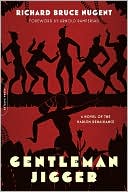You probably know several of the more well known artists and writers of the time: Zora Neale Hurston, Langston Hughes, Wallace Thurman, Paul Lawrence Dunbar and Alain Locke. Wikipedia says:
Challenging white paternalism and racism, African-American artists and intellectuals rejected merely imitating the styles of Europeans and white Americans and instead celebrated black dignity and creativity. Asserting their freedom to express themselves on their own terms as artists and intellectuals, they explored their identities as black Americans, celebrating the black culture that had emerged out of slavery and their cultural ties to Africa.
You see evidence of this in Ms Hurston's "Their Eyes Were Watching God"; have you ever read a more liberating experience for a black woman, hell, any woman, in the 1920's, to look in the eyes of her community and defiantly decide to live her life according to her own terms and love in her own way?
Wallace Thurman was another who constantly challenged people around him; they were often mistaken and then angered to find that within his very dark skin housed a highly intelligent and creative man. Oh, and the fact that he was openly gay too just kinda pissed people off.

I recently ran across the works of one of the lesser known Renaissance Niggerati, Richard Bruce Nugent; writer, actor, artist, unconventional personality. He died in 1987 in poverty, and was the subject of a 2004 movie "Brother to Brother."
I almost overlooked this movie because it was promoted as a love story between two gay men, one young, the other old. Fortunately, I gave it my usual 15 minute test; that is, if you can't capture and hold my attention in the first 15 minutes of a movie, then I change the channel.
I'm so glad I did. This movie was so much more than gay sex/love. It was a creative biography of Mr. Nugent's life and experiences with his fellow Renaissance artists. He offered first hand accounts about Langston, Zora, Wallace and others. He is probably LESS known because he chose to LIVE his life rather than WRITE about it. His only
 novel, "Gentleman Jigger", while written in the 1920s, was not published until 2002.
novel, "Gentleman Jigger", while written in the 1920s, was not published until 2002. His friend, Thomas Wirth wrote: Nugent was persistently unconventional in both his life and his work. He refused to pursue a "career." He refused to permit others to impose on him their definitions of who he ought to be either as an artist, an African American or a "man." He insisted on freedom when freedom was not allowed.
"Freedom when freedom was not allowed." Can you see how powerful this is? This is the new driving philosophy of my life. Just wait.








6 comments:
I am not familiar with his work, I'll have to look it up.
Thank you for sharing. I'm always looking to learn and explore something new. Thank you.
Mike: check out the movie, "Brother to Brother" as a good introduction.
MsKnowItAll: Black American consciousness tends to ebb and flow over time. The 1920's, the 1960's and 2008 are both examples of time when we true believe in our ability to overcome and to become the men and women God called us to be rather than what society tells us to be.
I feel like I'm going through my own renaissance right now and I'm doing my best to embrace this attitude as I break out and begin to chart my own course.
Thanks for the recommendation. I hadn't known about this movie but I've got it requested at the library now!
Thorn, I hope you enjoy it. I'm interested in hearing your thoughts about the movie and Mr Nugent's writings.
I have enjoy reading about the harlem Renaissance. I like Zora Hurton the best. We read about Jean Toomer in college. Thank you for your post.
Post a Comment